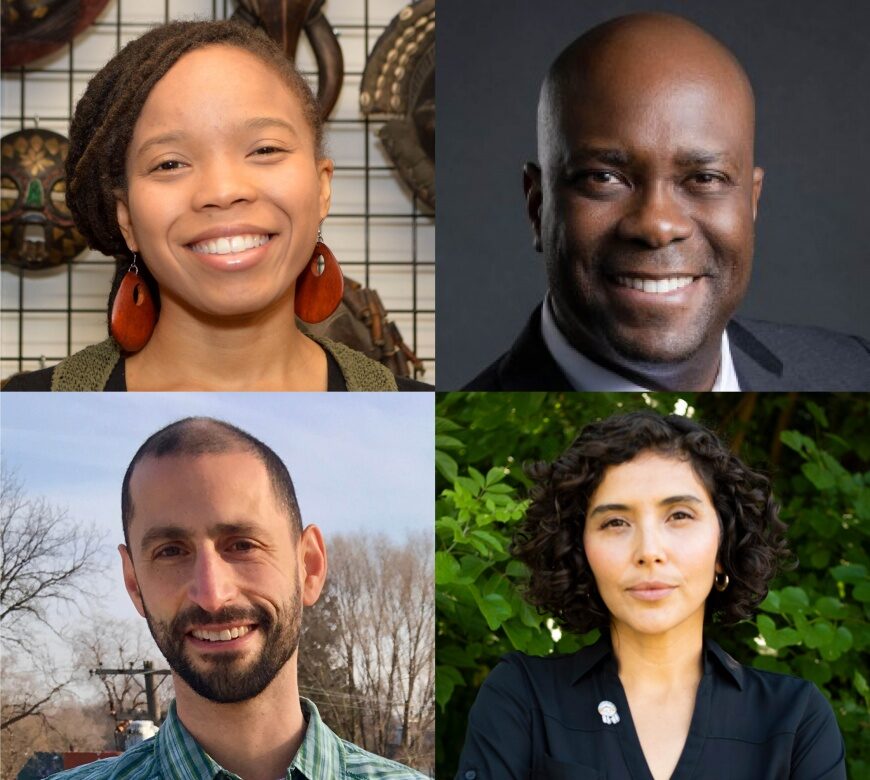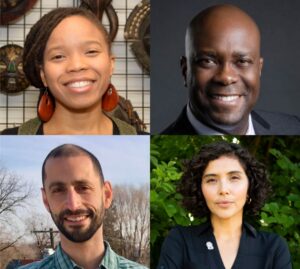Source: School of Environment and Sustainability

Clockwise from top left are shakara tyler, Cedric Taylor, Justin Schrott and Michelle Martinez.

Clockwise from top left are shakara tyler, Cedric Taylor, Justin Schrott and Michelle Martinez.
The U-M School for Environment and Sustainability is growing its environmental justice program with some exciting hires, bringing new expertise and courses that will provide students with more opportunities to learn from leaders that bring real-world experience and a track record of making genuine change.
SEAS was the first school in the United States to launch an environmental justice program that offered undergraduate and graduate degree specializations and is now home to one of the largest clusters of the field’s faculty and students nationwide. By expanding the program and building on its history as leaders in environmental justice, SEAS is continuing to foster the educational experience that communities affected by injustice have been demanding of universities.
SEAS welcomes the following leaders to the program:
Michelle Martinez (MS ’08), director of the Tishman Center for Social Justice and the Environment, and SEAS lecturer
Michelle Martinez is the inaugural director of the Tishman Center for Social Justice and the Environment. Martinez, a SEAS alum who studied under Professor Bunyan Bryant, will continue to build on Bryant’s legacy of activism and involvement in grassroots movements. In recent years, Martinez has been participating in SEAS events and contributing to SEAS master’s projects. In her new role, she will be developing new courses on power building, community organizing, and grassroots action, as well as spurring powerful initiatives that support students who are pursuing lifelong careers in environmental and climate justice. She will initiate a strategic planning process in her first year to envision the organization and growth of the new center. Martinez’s first course will be in the winter 2023 semester.
Martinez has 15 years of experience practicing environmental justice in her hometown of Detroit. Most recently, she served as executive director of the Michigan Environmental Justice Coalition; she is a founding member of the coalition and continues to serve on the board. Michelle also serves on the board of directors of We the People Michigan and is a contributing columnist to Planet Detroit, an online publication serving Detroit audiences with climate and environmental news.
Justin Schott (MS ’06), SEAS lecturer
Justin Schott will teach a 3-credit energy equity course this fall at the graduate level in addition to continuing his role as project manager of the Energy Equity Project, which is hosted by SEAS.
Prior to coming to EEP, Schott was Executive Director of EcoWorks, a Detroit nonprofit, from 2015 to 2020. He is an avid social entrepreneur and a recognized sustainability leader in Detroit. Prior to becoming executive director, Schott designed and managed the launch and operations of numerous community programs, including the Youth Energy Squad (founder), which grew from a summer pilot employing four students in 2009 to a city-wide partnership with Detroit Public Schools Community District. Schott also has worked closely on the creation of utility programs, including the Home Energy Consultation Program, which provided in-home energy efficient installations and education to 10,500 households in its first seven months. Schott has chaired the Coalition to Keep Michigan Warm and is a member of steering committees of the Detroit Environmental Agenda; Housing, Health and Heatwaves project; and Southeast Michigan Stewardship Coalition, and served as project manager of the Detroit Climate Strategy.
shakara tyler, SEAS lecturer
shakara tyler will teach a 3-credit environmental justice course at the graduate level this fall.
tyler is a returning-generation farmer, educator and organizer who engages in Black agrarianism, agroecology, food sovereignty and environmental justice as commitments of abolition and decolonization. She earned her PhD at Michigan State University in community sustainability and works with Black farming communities in Michigan and the Mid-Atlantic. She explores participatory and decolonial research methodologies and community-centered pedagogies in the food justice, food sovereignty and environmental justice movements. She also serves as board president at the Detroit Black Community Food Security Network, board member of the Detroit People’s Food Co-op and co-founder of the Detroit Black Farmer Land Fund, and is a member of the Black Dirt Farm Collective.
Cedric Taylor, visiting associate professor
After a successful year of teaching an environmental justice course at U-M Flint, Cedric Taylor will remain with SEAS through 2022 as an associate visiting professor. He will teach What Happened in Flint: The Causes and Consequences of the Water Crisis and Documentary Filmmaking for Activism: Benton Harbor.
Taylor is a sociologist and a documentary filmmaker. His scholarly and creative endeavors focus on racial health disparities, environmental justice and visual sociology. A former president of the Michigan Sociological Association, Taylor is a public sociologist who employs documentary film, visual media, and storytelling to engage the wider community in conversations around inequality. He is the director and co-producer of Nor Any Drop to Drink: Flint’s Water Crisis, which has been screened throughout the country and internationally. Taylor is an associate professor of Sociology at Central Michigan University.

